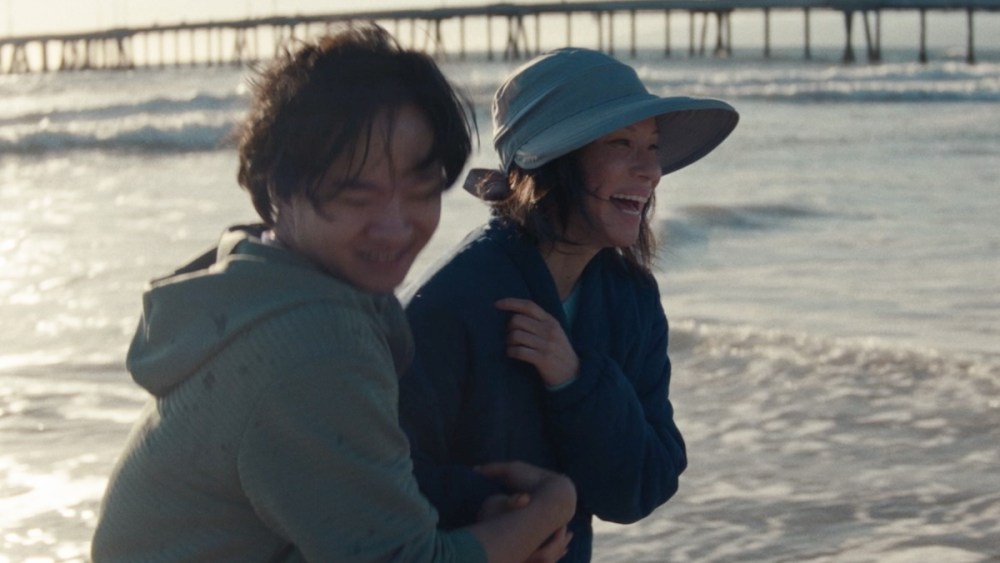In a historic legal decision last year, a Michigan jury found the parents of a 15-year-old school shooter responsible for the deaths their son had caused. Could they have prevented it? Based on an upsetting true story, director Eric Lin’s “Rosemead” focuses on a Chinese single mother who takes drastic measures to deal with her son’s dark impulses, substituting one tragedy for something equally unthinkable. Even more shocking than the film’s outcome is the career-redefining performance given by lead actor Lucy Liu, who explodes the slinky action-figure box that “Charlie’s Angels” and “Kill Bill” built around her, revealing the erstwhile “Ally McBeal” star in a completely different light.
As recently widowed Irene Chao, Liu trades her signature strut for a self-effacing shuffle, using makeup not to accentuate her beauty but to downplay it. In “Rosemead” (named for the east Los Angeles neighborhood where this true story took place), Liu transforms her body language entirely, wearing baggy clothes and cowering into herself as if trying to disappear from a world none too accepting of Chinese immigrants.
The independent drama, which premiered at the Tribeca Festival, was inspired by an eye-opening report in the Los Angeles Times on the treatment (or lack thereof) of mental health in Asian American communities, though most will go into the film uncertain as to where the story is headed. Lin comes to his feature directing debut from a background in cinematography, which explains why the meticulously composed film calls a measure of attention to the visuals from the opening shot.
In the movie’s silent first scene, a drone floats toward a window of the Sunset Hills Hotel, peering in at a family of three singing and dancing behind the curtains of a room. Later, Lin will reveal this moment of levity to be something between a memory and a fantasy of better times for the Chao family. Irene’s husband has since died, and her 17-year-old son, Joe (Lawrence Shou), who has been diagnosed with schizophrenia, hasn’t been the same since.
The withdrawn teen obsessively draws dark spiders in class and shows a disturbing fixation on news reports of school shootings. That alone does not a future killer make, though it takes Irene far longer than audiences to recognize the warning signs. Consistent with Chinese culture, where family matters are treated with far greater privacy than might be true of native-born Americans, Irene’s instinct is to push everything under the rug. As such, she lives in a state of denial, constantly making excuses for her son’s behavior.
Joe is seeing a counselor (Orion Lee), but Irene doesn’t want to engage with the treatment. That changes over the course of the film, which shows Irene taking an active interest in her son’s situation after he is picked up by police for wandering aimlessly in traffic. Joe’s school friends have expressed concerns of their own, reinforcing a central point of Marilyn Fu’s screenplay — namely, it’s not for lack of a supportive community that Joe is struggling to adapt.
The movie demonstrates nothing but empathy for Joe, though troubling patterns emerge that serve to explain (if not entirely justify) how Irene chooses to deal with the situation. It should be noted that she’s silently dealing with a mountain of her own issues, from a terminal cancer diagnosis to trying to manage the family printing business by herself — all of which she hides from Joe, for fear that the truth might overwhelm him. Irene is most honest with her friend Helen (Madison Hu), but even then, she keeps most of her headaches to herself.
This tendency toward discretion requires Lin to be fairly heavy-handed in the way he communicates what his characters are feeling. “Rosemead” would have been stronger if he had trusted the audience’s intelligence a bit more with regard to Joe’s anguish (seen in stroboscopic flashes) and Irene’s suspicions. A cringey trip to the beach where Irene struggles to smile between bloody coughs has all the subtlety of an after school special. There’s considerably more nuance in the stereotype-defying way “Rosemead” depicts the Chaos’ underrepresented community, focusing as it does almost exclusively on Asian Americans (apart from school administrators, police officers and a white gun shop owner).
In Irene’s case, she is most comfortable speaking her native Cantonese, delivering the English half of her dialogue with a thick accent and broken syntax. Liu’s bone-deep portrayal comes from careful observation, reflecting this exasperated yet proud woman’s attempts to raise a child in a country where so much of the language and culture eludes her. More often than not, movies like “Rosemead” don’t end with a group hug, as there’s no miracle cure for cancer or schizophrenia to solve the Chaos’ situation. Still, Lin handles that inexorable slide toward tragedy with commendable sensitivity. It’s a grim story, told in such a way that some good can come of it.
Read the full article here








